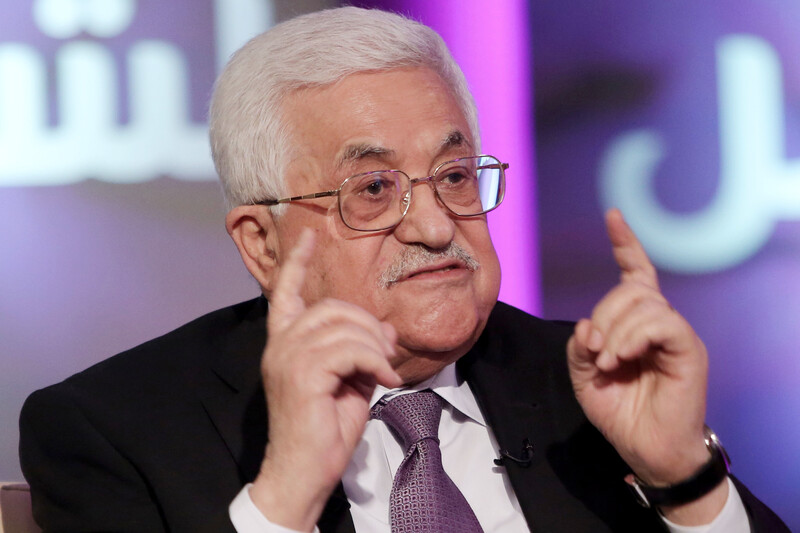The Electronic Intifada 6 May 2016

Mahmoud Abbas’ term as president expired years ago.
APA imagesIt is both an assertion of dominance and a sign of desperation.
As the Palestinian Authority struggles to contain deep public and political disenchantment, it appears to be engaged in a concerted effort to curb criticism of its highest leadership and shore up the power of its leader Mahmoud Abbas.
The Palestine Liberation Organization (PLO), dominated by Abbas’ Fatah faction, has cut funding to other member factions critical of the leadership.
In April, the PA also established a constitutional court, a move seen as an attempt to circumvent the Hamas-dominated legislative council that has not sat since 2007, in the event of a post-Abbas succession process that would likely be contentious.
Last week, meanwhile, the governor of Nablus was unceremoniously sacked from his position.
These moves come as criticism of the PA over its continued security cooperation with Israel, absent any discernible negotiations or progress to ensure Palestinian rights, continues to mount.
Abbas has insisted publicly on the importance of the continued close collaboration between Israeli occupation forces and PA security forces.
But an opinion poll from the Palestinian Centre for Policy and Survey Research (PCPSR) in early April found that two-thirds of Palestinians in the occupied West Bank and Gaza Strip oppose this cooperation.
Meanwhile, activists and others have complained of a clampdown on criticism of the highly unpopular policy that has extended even into the realm of social media.
Disillusionment runs deep
These developments all point to a multi-pronged strategy aimed at securing Fatah’s – and more specifically Abbas-loyalists’ – grip on control over the PA in the West Bank.
They also indicate that those around Abbas are not confident of their authority and, conversely, that widespread disillusionment with the PA is causing a measure of panic within its leadership..
Last week, Hamas won Birzeit University student elections for the second year in a row. Such student elections are closely watched as a bellwether for Palestinian public opinion.
The PCPSR survey found that there was little faith in Abbas personally. The PA leader secured only a 36 percent approval rating, 64 percent of respondents wanted his resignation and, in a run-off with Ismail Haniyeh, the Hamas leader would win by an 11 percent margin. But disillusionment runs much deeper.
Only about half of Palestinians under occupation still support a two-state solution and three in five think it is no longer possible due to Israel’s settlement construction.
Almost two-thirds of respondents want to abandon the 1993 Oslo accords that laid the groundwork for the PA and the peace process that followed, and that should have ended in 1999 with an end-of-conflict agreement.
Fifty-six percent support a return to an armed intifada, or uprising, and a full 65 percent think that if the current spate of sporadic knife attacks develops into a full-fledged intifada, it would serve Palestinian interests.
Such sentiments are anathema to everything Abbas – one of the key architects of Oslo – stands for. They reflect arguments Hamas has long made, that Israel never intended to end the occupation and that only armed resistance would force a change.
This, of course, is something of which the PA leadership around Abbas is acutely aware.
Rule by decree
The constitutional court decree – issued on 3 April – was clearly aimed at sidelining Hamas further in the West Bank. The court, whose decisions will be binding on the executive, legislative and judiciary branches of the PA, can now in theory appoint a successor to the 81-year-old Abbas.
And critics say its nine judges are stacked with Fatah loyalists.
The PA’s basic law states that in the event of the presidency becoming vacant, the president’s duties would fall to the speaker of the legislative council.
But that position is held by Aziz Dweik, a Hamas representative from Hebron, who is currently in an Israeli prison for the third time since he assumed his position after Hamas won legislative elections in 2006.
The council itself hasn’t sat since 2007 and new presidential and parliamentary elections – which should have been held in 2010 – are not likely any time soon.
PA officials say the new court is necessary to avoid constitutional chaos and legislative stasis.
But in the absence of a sitting legislature or new elections, the PA has in fact been governed by presidential decree since 2007 – in exactly the manner the constitutional court was established – and that has only served to shore up unaccountable power, say critics.
Hamas rejected the court, calling its establishment an “illegal” unilateral move that “reflects Abbas’ disregard for national consensus and his monopoly over national decisions.”
The controversy and the response from Hamas also underscore why the regular attempts at reconciliation between the two main Palestinian factions are viewed with little seriousness by a general public that has largely lost faith in their political leaderships.
While Ismail Haniyeh would beat Abbas in an election, the Hamas leader would lose to imprisoned Fatah leader Marwan Barghouti, according to the April poll.
Broader clampdown
The recent clampdown is not just aimed at Hamas but at political dissent from other smaller factions as well as from within Fatah. The constitutional court, for instance, will necessitate that any leadership challenge that doesn’t amount to an all-out revolt has to go through this legal hurdle.
Abbas loyalists are in charge of the PA’s six security services from where a potential successor to Abbas, in the shape of General Intelligence Service chief Majid Faraj, might be found.
But Abbas still seems permanently obsessed with real or imagined plots against his leadership, not least from former Gaza strongman Muhammad Dahlan, who was ousted from Gaza after a failed Fatah putsch against the elected Hamas government in 2007 that was, reportedly, personally endorsed by then US President George W. Bush.
Thus even mildly critical officials – as former PLO number two, Yasser Abed Rabbo, himself a veteran of the Oslo accords and by no means a rebel, found out last year when he was summarily fired – cannot consider themselves safe.
Nablus governor Akram Rajoub, a former ranking intelligence officer, was dismissed on 26 April reportedly in a single phone call from Abbas’ office.
It is not clear why the former major general was sacked, but Rajoub has had to deal with regular demonstrations against the PA in Balata refugee camp, the West Bank’s biggest, just on the edge Nablus.
He had previously been critical of Abbas, saying that the PA leader’s loyalists were being given too much leeway in the city.
Abbas also moved to withhold funds from two smaller Palestinian factions, the Popular Front for the Liberation of Palestine and the Democratic Front for the Liberation of Palestine. The funding is a holdover from when the PLO operated in exile and was keen to keep the various factions from being tempted by foreign paymasters.
Both factions had been vocally critical of continued security cooperation between the PA and Israel, and though PA officials deny a link, the move is hard to read as anything other than retaliation.
The effort spent on preventing or punishing political dissent suggests that the PA leadership sees little option: after a decade in power, Abbas has overseen only regression. Israeli settlements proliferate, the Palestinian polity is divided, the peace process is dead, the economy is moribund, electoral legitimacy has been exhausted and public sentiment is implacably hostile.
Much of this is of course down to Israel, but Abbas has shown no indication that he can find a way out. So how else to rule?
Omar Karmi is a former Jerusalem and Washington, DC, correspondent for The National newspaper.





